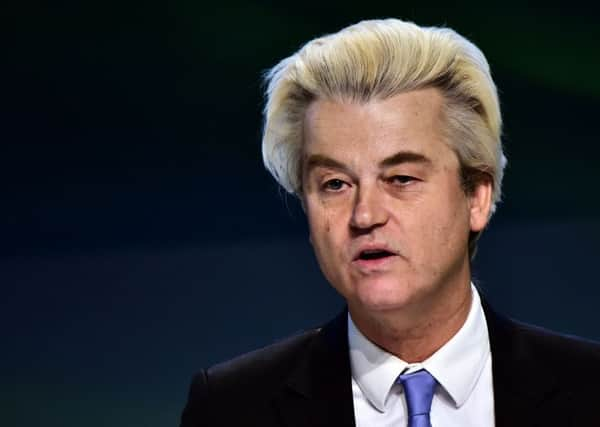Wilders to appeal after guilty verdict in hate speech trial


Populist anti-Islam politician Geert Wilders was found guilty yesterday of insulting and inciting discrimination against Moroccans, a conviction he immediately slammed as a “shameful” attack on free speech and an attempt to “neutralise” him.
Presiding Judge Hendrik Steenhuis said the court would not impose a sentence because the conviction was punishment enough for a democratically elected politician.
Advertisement
Hide AdAdvertisement
Hide AdWilders was not in court for the verdict, which came just over three months before national elections. His Party for Freedom is narrowly leading a nationwide poll of polls and has risen in popularity during the trial.
Wilders quickly released a video message, in English and Dutch, slamming the judgment and vowing to appeal.
“Today, I was convicted in a political trial which, shortly before the elections, attempts to neutralise the leader of the largest and most popular opposition party,” Wilders said. “They will not succeed.”
Even before the hearing, Wilders had vowed not to be silenced.
“Whatever the verdict, I will continue to speak the truth about the Moroccan problem, and no judge, politician or terrorist will stop me,” he tweeted.
The politically charged prosecution centred on comments Wilders made before and after the Dutch municipal elections in 2014. At one meeting in a café in The Hague, he asked supporters whether they wanted more or fewer Moroccans in the Netherlands. That sparked a chant of “Fewer! Fewer! Fewer!” – to which he replied: “We’ll take care of it.”
Prosecutors say that Wilders – who in 2011 was acquitted at another hate speech trial for his outspoken criticism of Islam – overstepped the limits of free speech by specifically targeting Moroccans.
He had denied the charges and insisted he was performing his duty as a political leader by pointing out a problem in society.
Advertisement
Hide AdAdvertisement
Hide AdJudge Steenhuis said: “Freedom of speech is one of the foundations of our democratic society.” But he added: “Freedom of speech can be limited, for example to protect the rights and freedoms of others, and that is what this case is about.”
Abdou Menebhi, president of the Euro-Mediterranean Centre for Migration and Development, welcomed the judgment.
He said: “For us, it’s a very important verdict.
“This gives the Moroccans who felt like victims a renewed belief in a democratic society.”